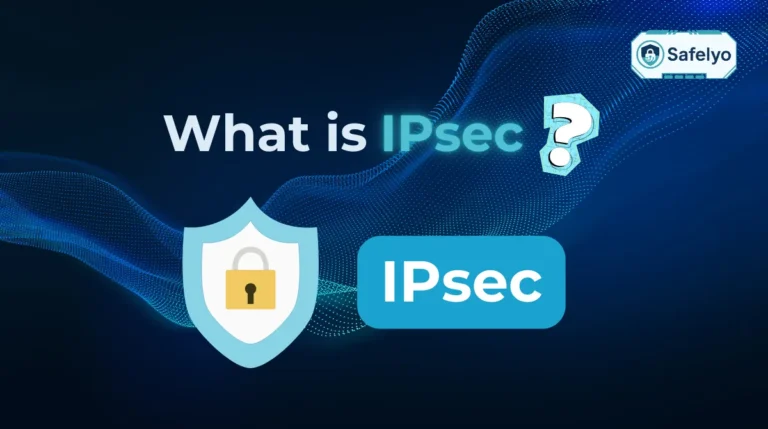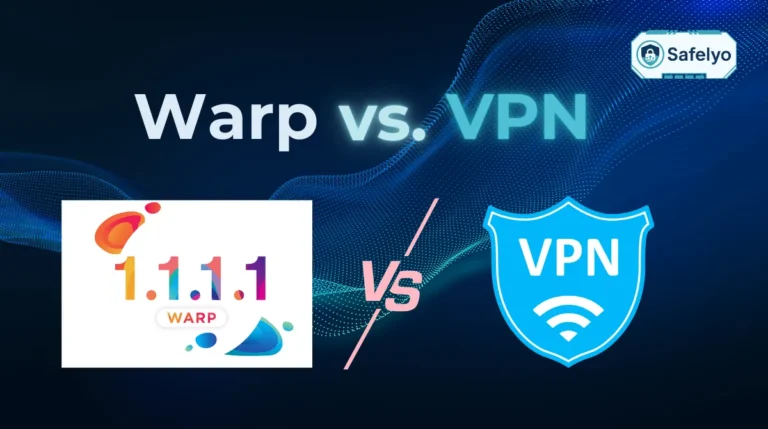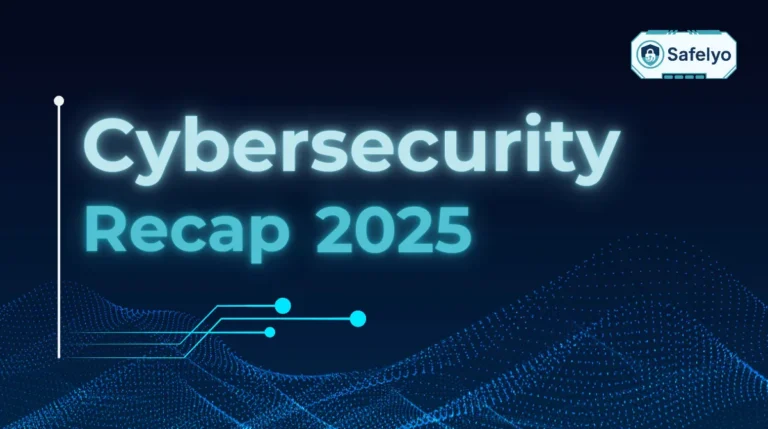Every click and login creates a digital footprint that advertisers and ISPs track relentlessly. While VPNs encrypt your entire device, they can often slow down your connection. Proxies offer a lighter, faster alternative, allowing you to mask your identity for specific browsers or tasks without the heavy encryption overhead.
To help you browse freely, here is a curated list of the Best Proxy Servers for Privacy in 2025.
-
Bright Data
Enterprise powerhouse with 150M+ IPs for maximum stability.
-
Smartproxy
User-friendly, affordable choice with a great dashboard for individuals.
-
Oxylabs
Strictly compliant, audited residential proxies for sensitive privacy needs.
-
IPRoyal
Budget-friendly option with legitimate residential IPs and transparent pricing.
-
SOAX
Clean mobile and residential IPs with precise city-level targeting.
-
Webshare
Best for beginners, offering a fast, capable free tier.
-
Rayobyte
US-based provider optimized for high-volume automation and scraping.
-
NetNut
Fast and stable direct ISP connectivity, bypassing P2P networks.
-
MarsProxies
Privacy-first provider in the Netherlands supporting anonymous crypto payments.
1. What is a proxy server? And types of proxy servers
A proxy server acts as a gateway between your device and the internet. Instead of connecting directly to websites, your connection is routed through the proxy, which masks your real IP address and can filter or alter traffic to protect your identity.
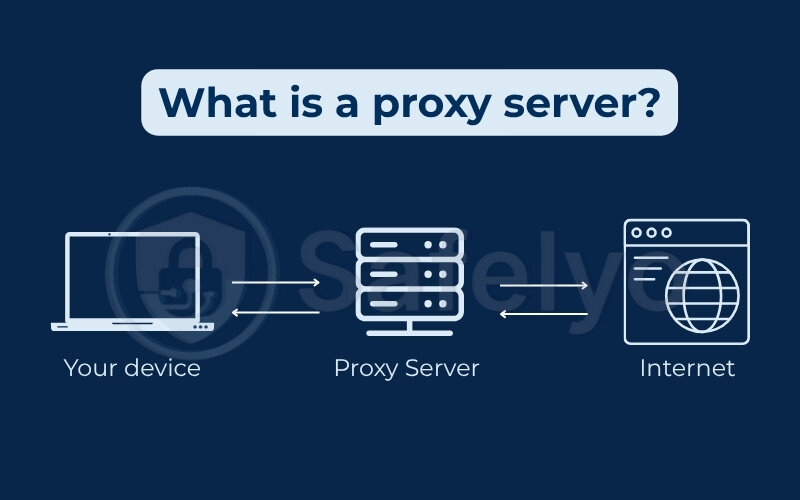
There are several types of proxy servers, each serving different purposes:
- Forward Proxy: Routes requests from a client to the Internet. Often used in business networks.
- Reverse Proxy: Sits in front of servers and manages traffic from users to the backend.
- Transparent Proxy: Reveals your original IP to the destination site and is often used for monitoring.
- Anonymous Proxy: Hides your IP but may identify itself as a proxy.
- Elite (High Anonymity) Proxy: Hides both your IP and the fact that it’s a proxy.
- Residential Proxy: Routes traffic through real residential IPs, making it appear as organic user activity.
- Datacenter Proxy: Fast and cost-effective, but easier to detect due to shared IP ranges.
- Rotating Proxy: Changes IPs periodically to improve anonymity.
Next, let’s explore how to evaluate proxy servers based on privacy and security factors that truly matter.
2. How to evaluate proxy servers for privacy and security
Not all proxy servers are built with privacy in mind. To find a secure and trustworthy option, you’ll need to look beyond speed and price.
This section breaks down the key factors to consider when choosing the best proxy servers for privacy, especially if you’re serious about anonymity and data safety.
2.1. Zero-logging policies and data retention
A zero-log policy means the provider does not store data about your activity – no browsing history, IP logs, or connection timestamps.
I once tested a proxy service that advertised privacy but buried its logging practices in the terms. After reviewing the fine print, I discovered it retained IP logs for 30 days. That was a red flag. Switching to a provider with independently verified zero-logs made a huge difference in peace of mind.
When evaluating this feature:
- Look for explicit “no logs” claims
- Check whether their privacy policy mentions third-party data sharing
- Prefer services with third-party audits validating their claims
2.2. Jurisdiction and legal requests (5 Eyes, etc.)
Where a proxy company is legally registered matters. Countries in the 5/9/14 Eyes alliances (like the US, UK, Canada, Australia, and New Zealand) may compel providers to share user data under legal orders.
Here’s what to consider:
- Prefer providers based in privacy-friendly countries (like Switzerland or Iceland)
- Review how the company handles legal data requests – some may have a canary warrant system
- Services outside surveillance alliances are generally better for strict privacy needs
2.3. Encryption protocols (if supported)
While not all proxies encrypt traffic (unlike VPNs), HTTPS proxies or SOCKS5 with SSL layers add some level of encryption.
Tip: If privacy is your top concern, always choose proxies that support HTTPS connections at a minimum.
In one case, I had to monitor a client’s competitor website via proxy. Initially, I used an unencrypted HTTP proxy and noticed strange redirects. Switching to a SOCKS5 proxy with SSL resolved the issue and protected the data in transit.
2.4. Third-party audits and reputation
Third-party security audits are rare in the proxy world, but valuable when available. They prove that the provider’s privacy practices have been independently verified.
To gauge a proxy service’s reputation:
- Look for audit reports or transparency reports
- Check reviews on platforms like Trustpilot, G2, or Reddit’s /r/privacy
- Investigate any history of data breaches or misuse
2.5. Terms of service and hidden clauses
Some services may look solid on the surface but include loopholes or concerning clauses in their ToS, like reserving the right to collect metadata for analytics.
Checklist:
- Scan for vague language like “may store minimal usage data”
- Avoid proxies that require excessive personal information for sign-up
- Confirm they allow privacy-focused use cases (e.g., journalist access, scraping, etc.)
According to OWASP, proxy misconfiguration and poor privacy policies are common vulnerabilities in commercial proxy services, especially among free or trial-based ones.
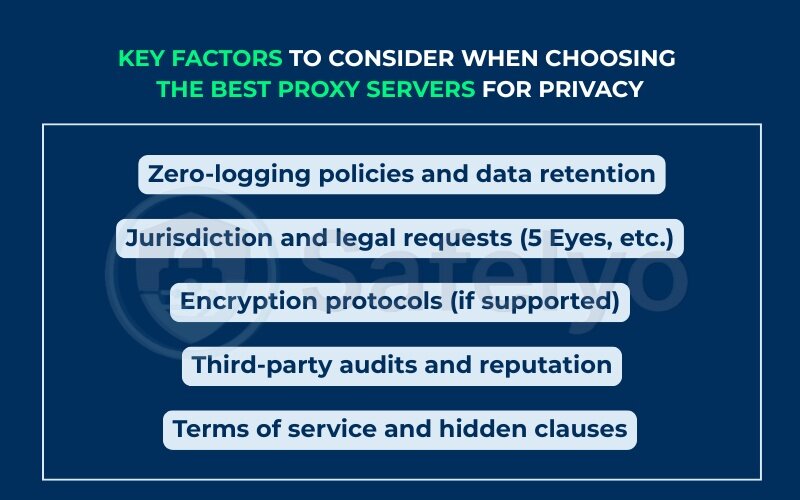
Understanding these privacy benchmarks helps you separate good proxy servers from those that are privacy liabilities. Next, we’ll compare the best proxy servers for privacy in 2025, with reviews, pros/cons, and visual rankings.
3. 9 best proxy servers for privacy in 2025
Choosing the right proxy server can feel overwhelming with so many providers claiming to offer top-tier privacy. To help you make an informed decision, we’ve compared the best proxy servers for privacy in 2025 based on speed, jurisdiction, logging policy, and reputation.
Visual comparison table: Best proxy servers (2025)
Here’s a quick overview comparing key privacy and performance aspects:
| Proxy Provider | Speed (1–10) | Privacy Score* | Jurisdiction |
|---|---|---|---|
| Bright Data | 9 | 8.5 | Israel |
| Smartproxy | 8 | 8.7 | Lithuania |
| Oxylabs | 9 | 9.0 | Vilnius, Lithuania |
| IPRoyal | 7 | 8.0 | UAE |
| SOAX | 8 | 8.3 | UK |
| Webshare | 8 | 8.2 | US |
| Rayobyte | 7 | 8.1 | US |
| NetNut | 9 | 8.6 | Israel |
| MarsProxies | 8 | 7.9 | Netherlands/Panama |
*Privacy Score is based on combined metrics, including logging transparency, encryption, audit presence, and data jurisdiction.
3.1. Bright Data
Bright Data (formerly Luminati) is one of the largest and most powerful proxy networks in the world, offering access to over 150 million residential IPs. It’s widely used in enterprise scraping, market research, and automation projects.
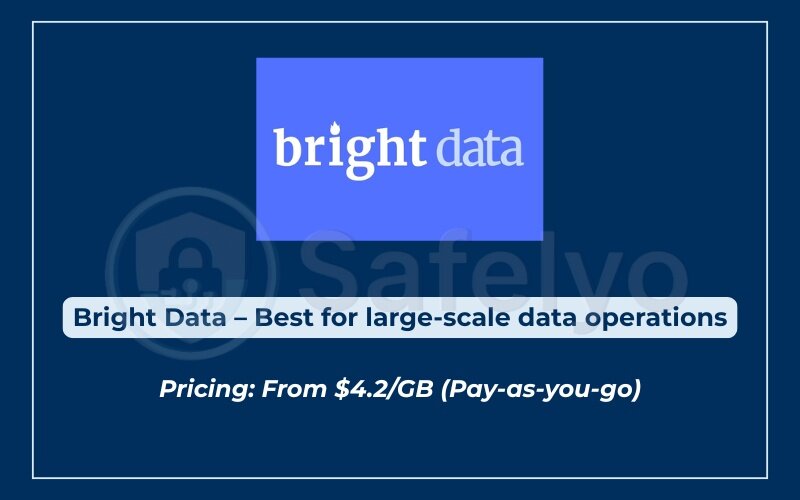
PROS
- Massive global IP pool (residential, datacenter, ISP, mobile)
- Excellent uptime and stability
- Customizable rotation and geo-targeting
CONS
- Logs metadata for abuse prevention
- Expensive for individual users
Privacy summary: While Bright Data isn’t the best proxy server for PC users seeking strict anonymity, it’s a good proxy server for high-volume business needs. Its logging policy may not meet the privacy expectations of journalists or whistleblowers.
Pricing: From $4.2/GB (Pay-as-you-go)
Bright Data – Best for large-scale data operations
When I needed to check how our website appeared in different regions, I tried Bright Data’s residential proxies. The dashboard was a bit overwhelming at first, but after a bit of clicking around, I was able to set up a basic rotation. It worked well for location testing, though I mostly used their support articles to figure things out.
3.2. Smartproxy (Decodo)
Smartproxy, now operating under the Decodo brand, offers a strong mix of privacy protection, ease of use, and affordability. It’s designed for individuals and teams who want powerful proxies without a complex setup.
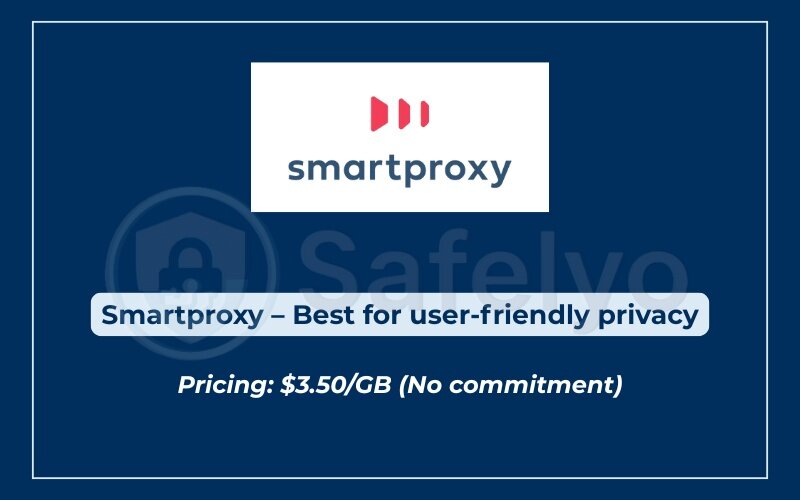
PROS
- Beginner-friendly dashboard
- Compatible with tools like Selenium, Puppeteer, and GSA
CONS
- Limited advanced features for developers
- The IP pool is smaller than Bright Data
Privacy summary: Smartproxy (now operating under the Decodo brand) is headquartered in Lithuania. While Decodo offers user-friendly proxy solutions, it does log certain metadata for compliance and abuse prevention. This makes Decodo a solid choice for users seeking easy setup and dependable proxies for everyday browsing or research, but it may not fully meet the needs of those who require strict anonymity.
Pricing: $3.50/GB (No commitment)
Smartproxy (Decodo) – Best for user-friendly privacy
I tested Smartproxy while managing a small-scale price-checking project for a local eCommerce store. What stood out was how beginner-friendly their dashboard was – I didn’t need to tweak too many settings to get started. For someone like me who isn’t doing large-scale scraping, it felt just right.
3.3. Oxylabs
Oxylabs is a Lithuania-based proxy provider that offers fully compliant, audit-backed infrastructure. It’s trusted by enterprise clients for GDPR-sensitive operations like financial data collection and cybersecurity research.
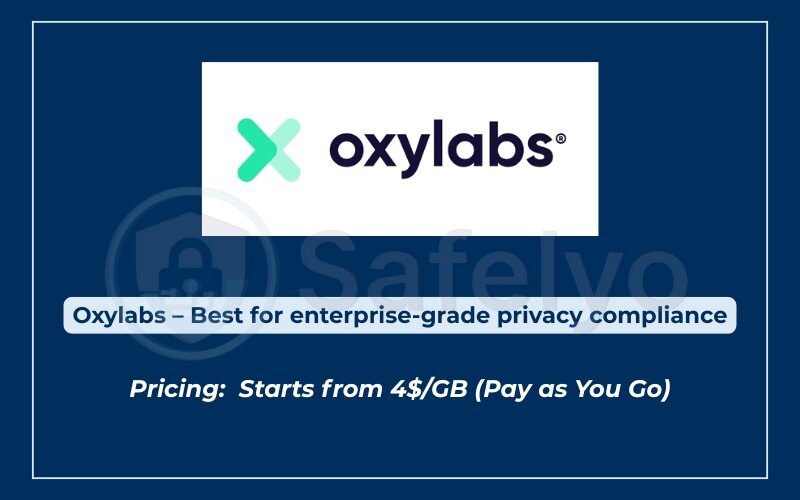
PROS
- Independently audited for GDPR compliance
- Offers residential, datacenter, and next-gen rotating proxies
- Legal transparency and documentation
CONS
- High entry cost
- No best proxy servers free tier
Privacy summary: Oxylabs is one of the few proxy providers with a public third-party audit and a strict no-logging policy. While pricey, it’s an ideal choice for professionals who need compliance and control, making it one of the best proxy servers for privacy in regulated sectors.
Pricing:
- Residential Proxies: Starts from 4$/GB (Pay as You Go)
- Datacenter Proxies: Starts from $1.2/IP (Free IPs)
- ISP Proxies: Start from $1.6/IP
- Dedicated Datacenter Proxies: Starts from $2.25/IP
- Mobile Proxies: Starts from $9/GB (Pay as You Go)
Oxylabs – Best for enterprise-grade privacy compliance
I tried Oxylabs during a free trial to explore how stable premium proxies were. The connection speeds were consistent, and I didn’t run into any IP bans while browsing region-specific sites. While I didn’t need all the enterprise features, it gave me a good sense of what top-tier proxy infrastructure looks like.
3.4. IPRoyal
IPRoyal provides a mix of residential, datacenter, and sneaker proxies with transparent sourcing and privacy-respecting policies. Based in UAE, it benefits from privacy-friendly laws and zero obligations under the 5/9/14 Eyes alliance.
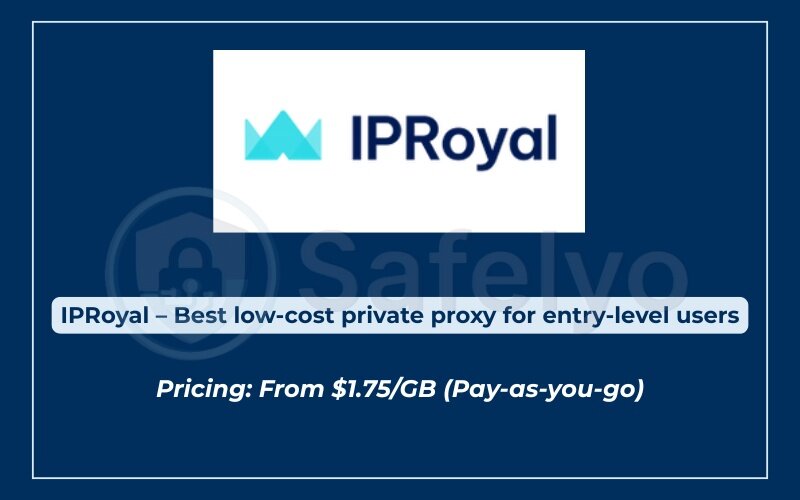
PROS
- Very affordable pricing
- Legitimately sourced Royal residential IPs
- Straightforward setup, no hidden fees
CONS
- Slower speeds during peak hours
- The interface could be more intuitive
Privacy summary: For those looking for a good proxy server on a tight budget. It’s one of the most affordable alternatives to the best free proxy server options, without sacrificing too much on quality.
Pricing: From $1.75/GB (Pay-as-you-go)
IPRoyal – Best low-cost private proxy for entry-level users
I used IPRoyal’s free “Pawns” program when testing basic browsing with a proxy. The speeds were slower than premium services, but it worked fine for checking region-blocked websites or doing quick research anonymously. It’s a practical option when you’re just getting familiar with proxies.
3.5. SOAX
SOAX specializes in clean, compliant residential and mobile proxy networks. With granular targeting, flexible rotation options. It’s designed for users who need precise location data with strong privacy control.
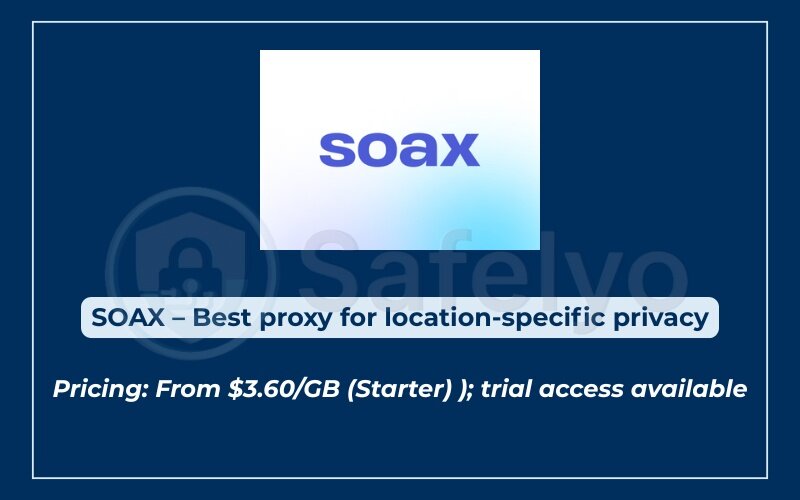
PROS
- City, carrier, and ASN targeting
- Real-time IP health check
CONS
- Slight learning curve for beginners
- Pricier than basic services
Privacy summary: SOAX stands out for use cases like geo-based research, app testing, and ad verification. Its strict privacy terms make it a contender for the best proxy server for PC if you’re conducting advanced location-based tasks.
Pricing: From $3.60/GB (Starter); trial access available
SOAX – Best proxy for location-specific privacy and mobile IPs
I gave SOAX a try when I was comparing local search results for a client. Their clean IPs helped me avoid CAPTCHA triggers, which I’ve dealt with before using other proxies. I liked being able to filter by ISP and city, even if I didn’t need the advanced targeting every time.
3.6. Webshare
Webshare offers both free and paid proxy plans, making it a popular entry point for users exploring proxy networks. While its free tier is limited to datacenter proxies, it’s surprisingly fast and stable for basic tasks.
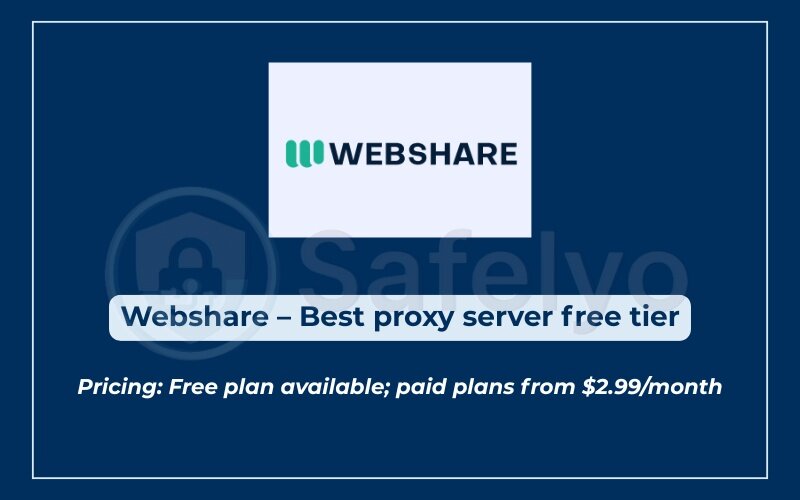
PROS
- One of the best free proxy servers available today
- No credit card needed for free signup
- Instant access to hundreds of IPs
CONS
- Retains logs for internal use
- Free plan lacks encryption and residential IPs
Privacy summary: Webshare is best suited for low-risk tasks like scraping public data or automating non-sensitive workflows. While it’s not ideal for full anonymity, it’s a good proxy server to start learning how proxies work before upgrading.
Pricing: Free plan available; paid plans from $2.99/month
Webshare – Best proxy server free tier with strong usability
Webshare’s free plan was my entry point when I started exploring proxies. I used it mainly for testing access to geo-locked content, like news sites. While the free tier had some limitations, it was simple to set up and didn’t require a credit card, which made it feel low-risk to experiment with.
3.7. Rayobyte – Best US-based proxy with configurable privacy
Rayobyte (formerly Blazing SEO) offers a variety of proxy types, including datacenter, ISP, and residential IPs. Based in the U.S., it’s popular for automation use cases like SEO, sneaker bots, and lead generation.
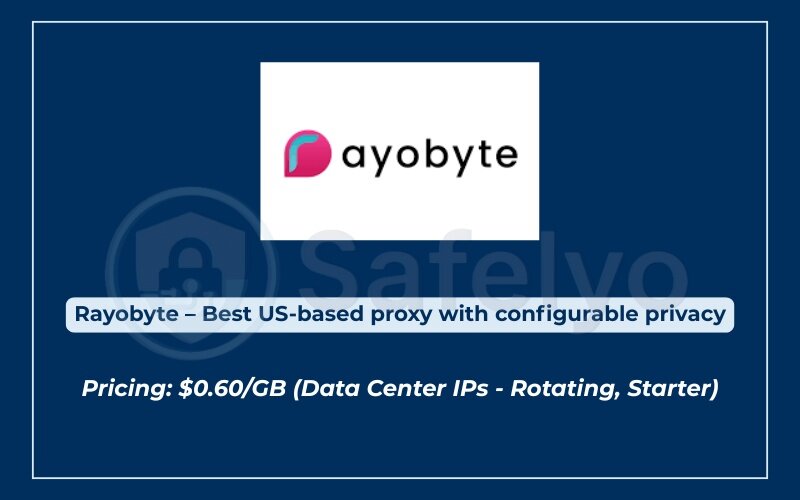
PROS
- Clean IP pool optimized for scraping and bots
- Customizable logging options
- Reasonable pricing for high-volume use
CONS
- U.S. jurisdiction (under 5 Eyes surveillance alliance)
- Residential proxies cost extra
Privacy summary: Rayobyte gives users flexibility. However, it’s not the top choice for journalists or whistleblowers due to its U.S. legal obligations. Still, it’s a good proxy server for moderate privacy needs with strong automation compatibility.
Pricing: $0.60/GB (Data Center IPs – Rotating, Starter)
Rayobyte – Best US-based proxy with configurable privacy
I briefly used Rayobyte when I was researching competitors in different regions. Their rotating residential IPs helped me avoid IP blocks on a few keyword tools. The setup was a bit more technical, but their support team was responsive when I ran into connection issues.
3.8. NetNut
NetNut is an Israeli proxy provider focused on performance and reliability. Unlike other residential networks, it routes through ISP-level IPs directly from tier-1 providers, leading to fast, stable connections.
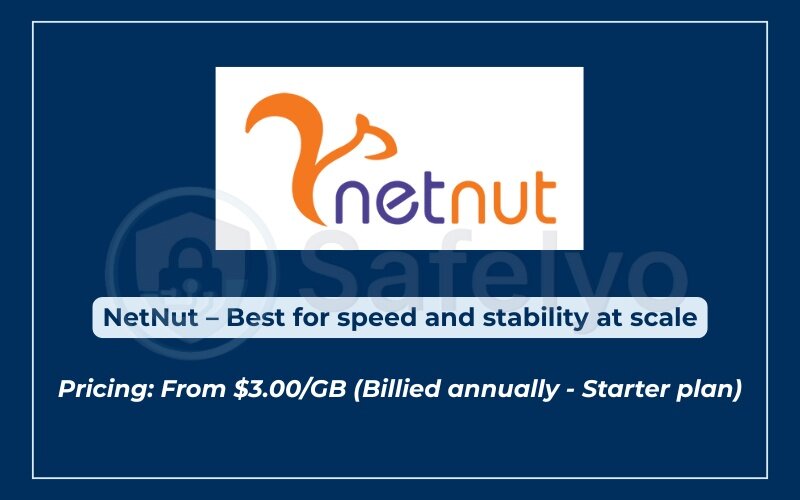
PROS
- ISP-level residential proxies (not peer-to-peer)
- Unlimited concurrent sessions
- Minimal latency even under heavy loads
CONS
- High price point for individuals
- Operates under Israeli jurisdiction, which may concern privacy-first users
Privacy summary: NetNut offers speed and scale that few can match, making it a strong best proxy server for PC in professional scraping environments. However, it’s less suitable for individuals seeking affordable or completely anonymous browsing.
Pricing: From $3.00/GB (billed annually – Starter plan)
NetNut – Best for speed and stability at scale
I trialed NetNut out of curiosity after hearing about its direct ISP connections. For my use – mainly checking blog visibility across regions – it worked smoothly. The experience didn’t feel drastically different from other providers, but it was stable and fast during my short test period.
3.9. MarsProxies
MarsProxies is a newer EU-based provider that focuses on affordable privacy with high-anonymity rotating proxies. It caters to users who want strong privacy without handing over personal details, accepting crypto payments and requiring minimal user info.
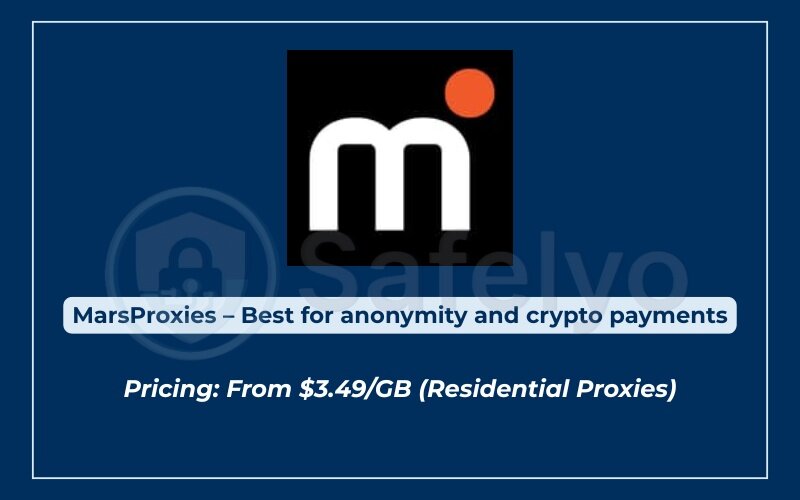
PROS
- Accepts crypto for maximum privacy
- Based in the Netherlands (strong data laws)
CONS
- Smaller IP pool compared to major providers
- No third-party audit available
Privacy summary: MarsProxies may lack the scale of Bright Data or Oxylabs, but it’s one of the good proxy servers for users who prioritize anonymity and jurisdiction safety over bells and whistles. It fills a niche between free proxies and enterprise giants.
Pricing: From $3.49/GB (Residential Proxies)
MarsProxies – Best for anonymity and crypto payments
I tried MarsProxies on a friend’s recommendation while managing a small Reddit research task. It was my first time using sneaker-focused proxies, and I was surprised by how easy it was to plug into tools like Multilogin. I didn’t use it for automation, but it handled session switching well.
4. Best proxy servers for privacy by use cases
Choosing the right proxy depends heavily on how you plan to use it. Not every provider is ideal for every purpose – some shine in journalistic environments, while others are optimized for streaming or P2P sharing. Below, we break down the best proxy servers for privacy based on specific use cases so you can choose the right fit for your needs.
4.1. Best for journalists and whistleblowers
Recommended: Smartproxy, MarsProxies, SOAX
These services operate outside high-surveillance jurisdictions, and don’t require excessive personal information at signup.
- Jurisdiction safety: Lithuania (Smartproxy), Netherlands (MarsProxies), UK (SOAX – use cautiously if jurisdiction is critical).
- Anonymity tools: Rotating residential or mobile IPs, crypto payment support, and optional encryption layers.
When I was exploring ways to access international news sites that were geo-restricted in my country, I tried MarsProxies. I liked that it didn’t ask for a lot of personal information and even supported crypto payments. The setup was quick, and it gave me a sense of privacy without needing advanced technical knowledge.
4.2. Best for torrenting and P2P
Recommended: Oxylabs, IPRoyal, SOAX
These providers offer stable residential proxies, with good bandwidth and IP rotation – suitable for torrenting and P2P activities without relying on shared peer-to-peer proxy infrastructure.
Important tip: Proxy servers do not encrypt traffic, so for torrenting, you should always use a VPN alongside to protect your IP from ISP monitoring.
Logging stance:
- Oxylabs has a strict no-logging approach and published acceptable use and privacy policies that make clear they do not monitor user activity.
- IPRoyal publicly commits to not logging identifiable user data (like browsing history or IP addresses), although it may retain anonymized metadata like session timestamps for troubleshooting.
- SOAX enforces GDPR-compliant data practices and ethically sources proxies, with policies indicating they do not log proxy request destinations or personal data.
I once needed to download some academic resources shared via peer-to-peer platforms, but my ISP kept throttling the connection. I tried IPRoyal alongside a VPN and noticed smoother performance. It wasn’t lightning-fast, but it got the job done without interruptions.
>> You might be interested in this article: Best VPN for torrenting: Top 5 P2P friendly networks of fast servers
4.3. Best for bypassing geo-restrictions
Recommended: Bright Data, NetNut, Smartproxy
These proxies offer expansive IP coverage across dozens of countries, allowing you to bypass firewalls or regional blocks.
Best features:
- Precise geo-targeting (city-level)
- Unlimited sessions
- Rotating IP pools
I wanted to access some content that was only available in Germany, so I tested Smartproxy with a German IP. It worked without triggering CAPTCHA or access blocks, which I’ve run into before with free proxies. For casual streaming or browsing, it felt reliable.
4.4. Best free proxy with privacy focus
Recommended: Webshare (Free Tier)
While not fully anonymous, Webshare’s free plan offers better control and speed than most free proxies.
- Limitations: Only datacenter IPs, basic logging in place, no encryption.
- Best use: Testing tools, light browsing, or education.
When I first started learning about proxies, I signed up for Webshare’s free plan. It didn’t require a credit card, which made it easy to try. I used it to access a few blocked news sites and test some basic traffic tools. For light tasks, it performed better than expected.
Each use case requires a different mix of jurisdiction, anonymity, and technical features. If your needs change over time, some providers like Smartproxy or SOAX offer enough flexibility to adapt.
5. Free proxy servers – Are they safe for privacy?
Free proxy servers may seem like an easy solution for anonymous browsing, but they often come with significant trade-offs. While some are safe for light, non-sensitive use, others can compromise your privacy in unexpected ways.
5.1. Common risks of using free proxies
Many free proxy services operate without transparency. Some of the most common risks include:
- Malware injection: Some proxies modify web content to serve ads or malware.
- Man-in-the-middle (MITM) attacks: Insecure proxies can intercept sensitive data like login credentials.
- Logging and reselling data: Free proxies often log your activity and sell it to advertisers or data brokers.
- No encryption: Unlike VPNs, most proxies don’t encrypt your traffic – meaning anyone can potentially snoop on your browsing.
According to Norton, “Free proxy servers can be dangerous. Some make money by tracking your online activity or injecting malicious ads into the pages you visit.”
5.2. When free proxies are acceptable
Free proxies might be acceptable in very limited use cases, especially when:
- You’re accessing non-sensitive websites (e.g., news, YouTube)
- You don’t need encryption or a login to accounts
- You understand the limitations and accept the risks
For example, I once used Webshare’s free plan to test geo-blocked access to a news site during travel. Since I didn’t log in or share personal data, I felt it was safe enough for that purpose.
5.3. Alternatives to free proxies
If privacy is your priority, safer alternatives to free proxies include:
- VPNs: Offer strong encryption and privacy protections (some have free tiers, like ProtonVPN)
- The Tor network: Ideal for anonymity, though slower and not suitable for all tasks
- Paid proxy trials: Many top proxy providers offer short-term or limited-use trials, giving you access to premium features without full commitment
For basic tasks, a reputable VPN with a free tier often provides better protection than a questionable free proxy.
>> Read more: The 5 best free VPN that are actually safe
6. Proxy vs VPN: Which should you choose for privacy?
Proxies and VPNs both help you mask your IP address and access restricted content, but their privacy protections differ significantly. Choosing between them depends on your needs for speed, encryption, and data security.
6.1. Key differences between proxies and VPNs
Here’s a quick comparison table to help you evaluate both tools:
| Feature | Proxy Server | VPN |
| IP masking | Yes | Yes |
| Encryption | No (usually) | Yes (strong encryption) |
| Speed | Varies, often faster for browsing | May be slower due to encryption |
| App coverage | Browser or specific apps only | Entire device |
| Privacy protection | Limited | Strong |
| Cost | Often free or low-cost | Free or paid |
6.2. Performance vs encryption: When does each win?
When I wanted to watch a region-locked trailer without signing into an account, I used a proxy for faster access. But when connecting to hotel Wi-Fi during travel, I relied on my VPN for safe browsing, even if it meant a slight speed trade-off.
Proxies win when you want
- Lightweight browsing
- Faster speeds
- Simple geo-unblocking without login
VPNs win when you need
- End-to-end encryption
- Protection on public Wi-Fi
- Full-device anonymity
6.3. Hybrid use cases: Combining proxy + VPN
Some users combine both for specific workflows:
- Use VPN for secure connections
- Layer a proxy for location flexibility (e.g., testing websites or managing social media accounts)
If you’re managing multiple accounts or need IP diversity without sacrificing security, this hybrid approach may offer the best of both worlds.
7. FAQs on the best proxy servers for privacy
Still have questions about how proxies protect your privacy or when to use them? This section addresses some of the most common concerns users have when choosing a secure and private proxy service.
Are proxy servers legal to use for privacy?
Yes, using proxy servers is generally legal in most countries. However, legality depends on how they’re used. Accessing geo-blocked content or engaging in illegal activities through a proxy may violate terms of service or local laws.
Which proxy type offers the most anonymity?
Residential proxies usually offer the highest level of anonymity. Because they use IPs from real devices and ISPs, they are harder to detect and block compared to datacenter proxies or transparent proxies.
Can I use proxies for streaming securely?
Yes, but with limitations. Some high-quality proxies-especially rotating residential or dedicated streaming proxies—can access geo-restricted streaming platforms. However, they may not encrypt your data, so a VPN is safer for streaming over public Wi-Fi.
How do proxy logs affect privacy?
Logging can significantly undermine your privacy. If a proxy provider keeps usage logs (such as IP addresses, timestamps, or visited URLs), those logs could be handed over to authorities or leaked. Look for proxies with a strict no-log policy and transparent terms of service.
Do proxies work in restrictive countries like China?
Some proxies may work in restrictive regions, but success is inconsistent. China and similar countries often block known proxy IPs. VPNs with obfuscation or stealth modes are typically more effective in bypassing censorship.
8. Conclusion
Choosing the best proxy servers for privacy means looking beyond speed or price. The real value lies in how well a provider protects your identity, minimizes data collection, and respects your digital freedom.
Here are the main takeaways from this guide:
- Not all proxies are created equal – privacy depends on encryption, jurisdiction, and logging policies.
- Top-rated options like Smartproxy, Bright Data, and Oxylabs stand out for transparency and security.
- Free proxies can serve casual needs but often lack key protections.
- Use-case fit matters: choose based on what you need – streaming, scraping, or anonymity.
- Combining proxies with VPNs or using rotating IPs can enhance your protection in certain scenarios.
When I first started testing proxy tools for personal use, I didn’t pay much attention to jurisdiction or logging. But after noticing a few strange ads and DNS errors, I realized how easy it was to overlook privacy red flags. Switching to a provider with clear no-log policies and audited infrastructure made browsing noticeably smoother – and a lot more reassuring.
Whether you’re safeguarding sensitive research or just exploring content freely, the right proxy can be a simple but powerful privacy upgrade.
For more practical reviews and privacy-first tool guides, explore the “Digital Tools & App Review” section at Safelyo.

